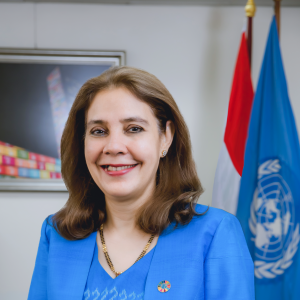H.E. Pak Tri Tharyat, Director General Multilateral Cooperation, Kemlu
Mr. Jie Zhao, Chief Regional Bureau for Asia and the Pacific, UNIDO
Mr. Marco Kamiya, UNIDO Representative for Indonesia and Timor Leste
Mr. Alfonso Vegara, Founder and Honorary President of Fundacion Metropoli, President of the Fundación Metrópoli, Spain, former president of ISOCARP
Pak Troy, OIKN
Distinguished moderators, panelists and speakers
I am delighted to join you today as we take the agenda of clean, green and low-carbon cities forward in Indonesia, within ASEAN and across the planet.
I would like to thank the Government for hosting the Bridge for Cities initiative in partnership with UNIDO, which has been a leader in promoting sustainable urban-industrial development.
Also, thanks to UN-Habitat, C40, and UNOPS for coordination and partnerships.
Jakarta exemplifies the dynamism and potential of urban development and today’s platform enables us to strengthen partnerships and exchange ideas to drive innovation for our urban future.
Indonesia is increasingly urbanizing with 58% of people already living in towns and cities.
This is projected to increase to 64% by 2030 with three-quarters of Indonesians likely live in cities by mid-century.
The Government’s commitment, in partnership with the private sector, civil society and the UN, will be vital to creating sustainable, resilient, and inclusive urban areas that can serve as models for other nations.
This commitment is highlighted by Nusantara, a visionary approach to aligning urbanization with the SDGs as the new capital is set to become a green city.
As part of this, it aims to be “sustainable forest city” with 65% of tropical forests restored in the Capital Region. Nusantara will also position itself as a net-carbon sequestration model aiming to reach 20% of energy generated from renewables by 2030, to meet most of the city’s energy needs.
As Indonesia’s industrialization is also proceeding apace, greening cities will need to go hand in hand with greening industrial parks and economic zones.
Encouragingly, we are seeing increasing demand from industrial parks nationwide to align with international standards by introducing the latest available green technologies.
The UN, led by UNIDO, is working with five of these parks with more than 700 companies to reduce GHGs, save energy, cut back water use and boost renewables.
In Aceh, South Sumatra, East and West Java, UNIDO in partnership with the private sector, is introducing enhanced oil recovery technology, in fertilizer factories. This reduces emissions by 15% and cuts production costs by $47million.
Similar ambition is being expanded to the iron and steel sectors by introducing electric arc furnaces, which reduces energy consumption.
Importantly, the private sector has been quick to scale up these technologies at their own cost because they positively impact bottom lines while reducing carbon footprints.
This transformation needs to extend to all sectors of the economy.
Beyond the environmental benefits, greening industry will also generate green jobs for people in both urban and rural areas.
To that end, the UN, led by ILO, is focusing on bolstering vocational training and education in support of skilling, upskilling and reskilling in partnership with industrial parks.
All these undertakings will require not only long-term commitments but blended financing models as well.
Indonesia already leads on these as the country is leveraging innovative financing mechanisms.
The UN in partnership with the Ministry of Finance has supported the mobilization of $10 billion through sovereign and corporate bonds benefitting 48 million people, with two in three of them being women, children and young people.
Taking a similar blended financing approach to cities will yield transformative results in mobilizing financing for local infrastructure, public services and sustainable development in line with the SDGs.
I am heartened that the Government is assessing the financial viability of municipal bonds for eight provinces which could generate $2 billion towards speeding up progress on the localization of the SDGs.
In closing, let me emphasize the importance of building bridges for sustainable, inclusive and climate-resilient cities that rest on these pillars of decarbonization, green industry, and innovative financing.
Through them, Indonesian cities will be leading lights of urban development.
I am very much looking forward to your insights during today’s discussions.
Thank you.



